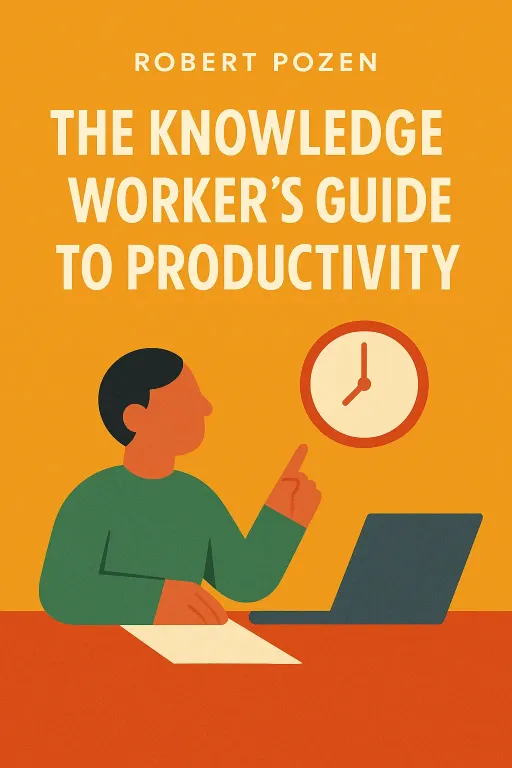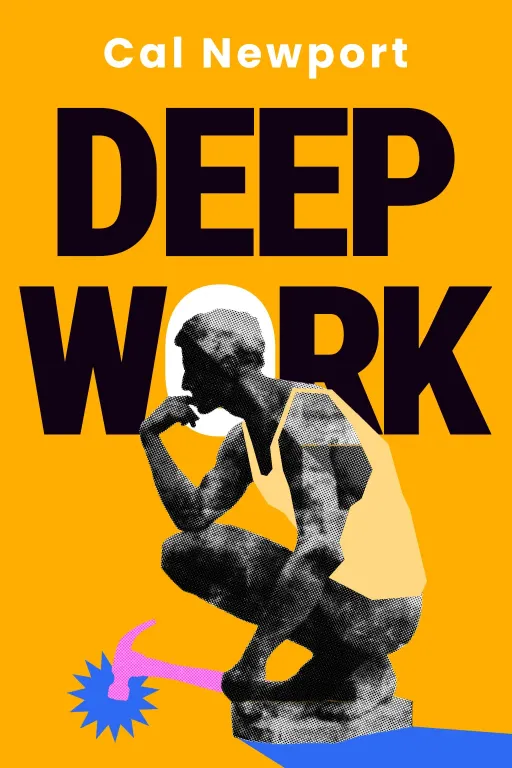
The Knowledge Worker's Guide to Productivity
12 minIntroduction
Narrator: Imagine overhearing a conversation between two young professionals. A lawyer from New York proudly announces he billed three thousand hours last year. Not to be outdone, a consultant from Chicago boasts that she worked fifteen-hour days, mostly on the road. They seem to be competing for a prize, but the real question is, what prize are they winning? Are their clients impressed by the long hours, or do they care more about the results and the costs? This obsession with "face time" and hours worked, rather than outcomes, is a trap that ensnares countless knowledge workers, leaving them feeling busy but ultimately unproductive.
In his book, The Knowledge Worker's Guide to Productivity, Robert Pozen dismantles this flawed paradigm. He argues that true success isn't measured by the clock but by the quantity and quality of results achieved. The book provides a practical roadmap for shifting focus from effort to accomplishment, offering a new way to think about work, manage time, and build a more effective and satisfying career.
Redefine Productivity as Results, Not Hours
Key Insight 1
Narrator: The foundational principle of the book is a radical redefinition of personal productivity. It is not about managing time to cram more tasks into a day or being the first to arrive and the last to leave the office. Instead, Pozen defines productivity as the quantity and quality of your results in achieving your own prioritized objectives. This is a crucial mindset shift from inputs, which are the hours you work, to outputs, which are the valuable results you produce.
This philosophy was perfectly captured in an anecdote from Pozen’s own career. When he was interviewing for the role of general counsel at Fidelity Investments, he asked the chairman, Ned Johnson, for a job description. Johnson’s reply was simple but profound: "You want a job description? It's very simple: figure out what needs to be done and do it!" This wasn't a vague instruction; it was an empowering directive to be proactive, to identify problems, and to deliver solutions. It encapsulated a culture focused on outcomes, not processes. Adopting this mindset is the first and most critical step toward genuine productivity.
Align Your Time with Your Priorities
Key Insight 2
Narrator: Many professionals are caught in a state of "ready, fire, aim," rushing into action without a clear sense of purpose. This leads to a significant mismatch between what they deem important and how they actually spend their time. Pozen introduces a six-step process to correct this. It begins with writing down all professional activities and organizing them by time horizon: long-term Career Aims, medium-term Objectives, and short-term weekly Targets.
The story of Joshua, a retail store manager, illustrates this process perfectly. Overwhelmed and wanting to advance his career, Joshua listed everything from hiring staff to his ultimate goal of becoming a top executive. By categorizing these into Aims, Objectives, and Targets, he could see how his daily tasks, like writing a weekly sales report, connected to his larger objective of increasing profits. He then ranked his objectives by considering three factors: what he wanted to do, what he was good at, and what the organization needed from him. This exercise gave him profound clarity, allowing him to consciously allocate his time to the activities that would have the greatest impact on his most important goals, rather than simply reacting to the demands of the day.
Start at the End to Overcome Inefficiency
Key Insight 3
Narrator: For any high-priority project, the natural tendency is to start by gathering as much information as possible. Pozen argues this is inefficient and often leads to wasted effort. Instead, he advocates for focusing on the final product by formulating tentative conclusions or hypotheses at the very beginning. This approach, similar to the scientific method, provides a clear focus for all subsequent research and analysis.
Consider a researcher at Harvard Business School tasked with evaluating the strategy of a Chinese insurance company. After a week of gathering data on the company's history, management, and financials, she was drowning in information but had no clear idea of its strategy. Pozen advised her to stop researching and instead write down a tentative conclusion. She hypothesized that the company was trying to become a "financial supermarket." This single hypothesis immediately focused her work. She no longer needed to collect every piece of data; she could now concentrate on the critical issues for that specific strategy, such as its cross-marketing plan and technological platform. By starting with a potential end-point, she was able to work more efficiently and produce a far more insightful analysis.
Master the Small Stuff with the OHIO Principle
Key Insight 4
Narrator: While high-priority projects demand focus, low-priority tasks can accumulate and drain mental energy. To manage this, Pozen champions the OHIO principle, which stands for "Only Handle It Once." The goal is to deal with low-priority items immediately to prevent them from creating a backlog.
Pozen shares a personal story about receiving a small tax deficiency notice. Busy with other things, he put the letter on a shelf. A week later, when he decided to deal with it, he couldn't find the letter and wasted an hour searching for it. Once he found it, he had to reread it to remember the details. He realized that if he had simply handled it once—by immediately writing a check or calling the agency—he would have saved time and avoided the lingering anxiety of an unfinished task. Applying the OHIO principle to emails, quick requests, and other minor items frees up valuable time and mental space for the work that truly matters.
Delegate with Ownership to Magnify Your Team's Impact
Key Insight 5
Narrator: A manager's productivity is not just about their own output; it's about magnifying the output of their entire team. The key to this is effective delegation, but not just of tasks. Pozen advocates for delegating ownership. This means setting clear goals and metrics, but then giving employees broad discretion to decide how to achieve them. This fosters an entrepreneurial spirit and a sense of responsibility.
A powerful example of this comes from a Marine Corps war game. Lieutenant General Paul Van Riper was tasked with commanding a "rogue" army against the technologically superior U.S. forces. Instead of a rigid, top-down command structure, he empowered his subordinates to make decisions on their feet. This decentralized approach allowed his forces to be agile and adaptive. While the U.S. military became bogged down by its own complex hierarchy, Van Riper’s army reacted quickly to the "fog of war" and ultimately "defeated" the U.S. forces. This demonstrates that when you trust your team and give them space to own their work, they become more adaptable, engaged, and effective.
Manage Your Boss as a Strategic Partner
Key Insight 6
Narrator: Productivity isn't just about managing down; it's also about managing up. This doesn't mean manipulation, but rather establishing a mutually beneficial partnership with your boss. According to management expert Peter Drucker, "You do have to manage him, however, so that he becomes your resource for achievement, accomplishment, and personal success." This involves understanding your boss's goals, pressures, and preferred communication style, and then adapting your own approach to be compatible.
It also means being a reliable team player. At the SEC, young lawyers were often asked to help with mundane tasks like copying and stapling briefs during emergency deadlines. Some shied away from this "grunt work," quickly earning a reputation as prima donnas. Those who willingly pitched in, however, were seen as dependable and committed. They understood that their boss's success was their success. By making your boss's job easier and helping them look good, you build trust and goodwill, which are invaluable assets for your own career.
Embrace Change While Holding Fast to Your Principles
Key Insight 7
Narrator: The modern working world is defined by constant change. Resisting it is often futile and counterproductive. In the 1980s, the Motion Picture Association of America (MPAA) fought desperately against the rise of the VCR. Its head, Jack Valenti, famously told Congress that the VCR was to the American film producer "as the Boston Strangler is to the woman home alone." He was terrified it would destroy the industry.
Of course, he was wrong. The VCR, and its successor the DVD, created a massive new revenue stream for home video that eventually surpassed box office earnings. The MPAA's failure to adapt nearly cost them a huge opportunity. Pozen argues that while we must embrace change by developing transferable skills and staying adaptable, we must also hold fast to unchanging principles. These include economic fundamentals, like the fact that a business must eventually turn a profit, and personal integrity. A reputation for honesty and fairness, as Warren Buffett noted, takes 20 years to build and five minutes to ruin. Navigating a dynamic world requires the flexibility to change with the times and the integrity to know what should never change.
Conclusion
Narrator: The single most important takeaway from The Knowledge Worker's Guide to Productivity is the profound mental shift from valuing hours to valuing results. This isn't just a technique; it's a philosophy that reorients your entire approach to work. By defining your goals, focusing on the final product, and aligning your daily actions with your highest priorities, you move from being merely busy to being genuinely effective.
Ultimately, the goal of productivity isn't just to get more done at work, but to build a more fulfilling life. The efficiency you gain is time you can reinvest—in your family, your health, and your passions. The real challenge the book leaves us with is this: now that you have the tools to focus on results, what results truly matter to you, and how will you start achieving them today?









